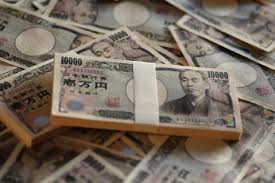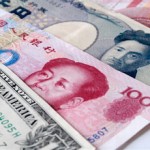Yen Advances on Haven Demand Amid Global Plunge in Equities

The yen gained the most in two months against the dollar as a plunge in global stocks revived demand for Japan’s currency as a haven.
The yen rose versus all but one of its 16 major peers as the Nikkei 225 Stock Average fell for the first time in eight days, the Stoxx Europe 600 Index dropped for a second day and futures signaled a second day of losses for the Standard & Poor’s 500 Index. Australia’s dollar touched a four-year low amid a decline in oil prices. The greenback fell from the strongest level in two years versus the euro and China’s yuan slid the most in six years as export growth slowed.
“The yen has strengthened amidst more risk-averse trading conditions as global equity markets and commodity prices have declined,” said Lee Hardman, a foreign-exchange strategist at Bank of Tokyo-Mitsubishi UFJ Ltd. in London. “The U.S. dollar has also pared some recent gains amidst the selloff, which may be more a reflection of increasingly elevated long-dollar positions.” A long position is as bet an asset’s value will increase.
The yen gained 0.9 percent to 119.61 per dollar at 8:40 a.m. New York time. It has appreciated 1.6 percent this week, poised for the steepest two-day jump since Oct. 7. The yen strengthened 0.4 percent to 148.03 per euro. The dollar weakened 0.5 percent to $1.2379 per euro.
The Bloomberg Dollar Spot Index, which tracks the U.S. currency against 10 trading partners, fell 0.5 percent to 1,115.52. It closed on Dec. 5 at 1,122.34, the highest since March 2009.
Volatility Jumps
Currency volatility reached the highest in more than a year. JPMorgan Chase & Co.’s Global FX Volatility Index was little changed at 9.44 percentage points after reaching 9.54 percentage points, the highest level since September 2013.
Australia’s dollar fluctuated against the dollar as it threatened to extend its losses to a ninth day, the longest skid since it was allowed to float freely in 1983. The currency has weakened as a slide in commodity prices has damped the outlook for countries that rely on sales of raw materials.
The National Australia Bank Ltd. said its index of the nation’s business sentiment dropped to 1 in November from 5 a month earlier, citing a survey of more than 400 companies. NAB Chief Economist Alan Oster said the company is now predicting the central bank will cut interest rates in March and August.
Global Slowdown
“The Aussie is leading losses in commodity currencies with oil declining as a slowdown in the global economy reduces demand,” said Junichi Ishikawa, an analyst at IG Markets in Tokyo. “Gains in the greenback against its Australian peer are spreading to the dollar-yen cross rate as well.”
The Aussie traded at 83 U.S. cents after earlier dropping to 82.24 U.S. cents, the lowest since June 2010.
West Texas Intermediate crude dropped to as low as $62.25 a barrel, the lowest level since July 2009, before trading at $63.63 today. Brent slid to $66.19 yesterday, the lowest close since September 2009, and traded at $66.62 today.
China’s yuan dropped for a second day after data yesterday showed exports increased in November less than economists forecast, while imports unexpectedly declined. Interest-rate swaps rose to a three-month high after policy makers narrowed the pool of corporate debt that can be used as collateral for short-term loans.
The currency weakened as much as 0.6 percent, according to China Foreign Exchange Trade System prices, the most since March 20, before trading 0.2 percent lower at 6.1855 per dollar.
Energy Prices
The dollar weakened against most of its major peers as the drop in energy prices has boosted speculation the Federal Reserve will be able to delay raising interest rates amid a lower outlook for inflation. The Federal Open Market Committee will announce its latest policy decision on Dec. 17.
Any delay in a rate increase will “temporarily offset the inflationary impact from the tightening U.S. labor market, which may act as a dampener on U.S. dollar demand in the near term,” Bank of Tokyo-Mitsubishi UFJ’s Hardman said. “However, the case for a stronger U.S. dollar alongside higher short-term U.S. rates still remains in place.”
Source: Bloomberg – Yen Advances on Haven Demand Amid Global Plunge in Equities



























